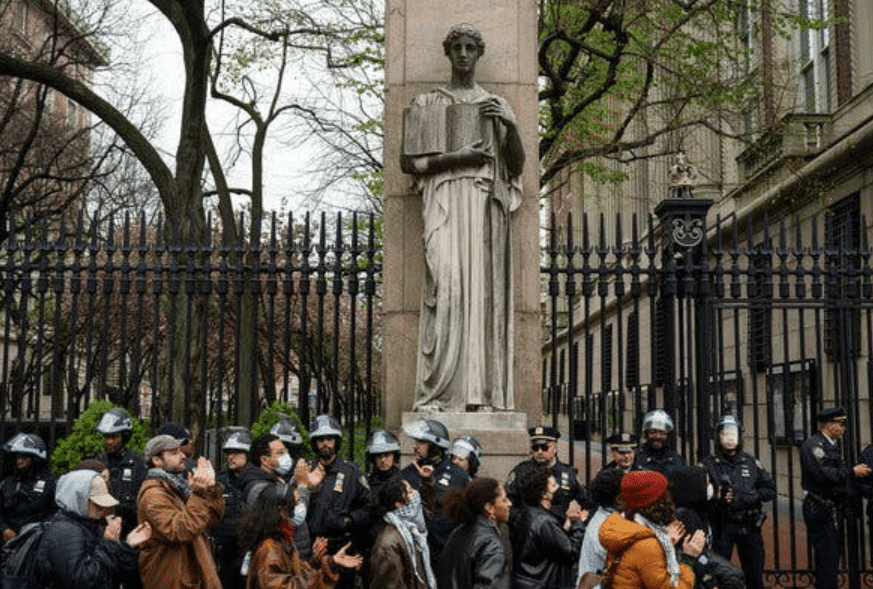You’re reading the John McWhorter newsletter, for Times subscribers only. A Columbia University linguist explores how race and language shape our politics and culture.
Last Thursday, in the music humanities class I teach at Columbia University, two students were giving an in-class presentation on the composer John Cage. His most famous piece is “4’33”,” which directs us to listen in silence to surrounding noise for exactly that amount of time.
I had to tell the students we could not listen to that piece that afternoon because the surrounding noise would have been not birds or people walking by in the hallway but infuriated chanting from protesters outside the building. Lately that noise has been almost continuous during the day and into the evening, including lusty chanting of “From the river to the sea.” Two students in my class are Israeli; three others, to my knowledge, are American Jews. I couldn’t see making them sit and listen to this as if it were background music.
I thought about what would have happened if protesters were instead chanting anti-Black slogans or even something like “D.E.I. has got to die,” to the same “Sound Off” tune that “From the river to the sea” has been adapted to. They would have lasted roughly five minutes before masses of students shouted them down and drove them off the campus. Chants like that would have been condemned as a grave rupture of civilized exchange, heralded as threatening resegregation and branded as a form of violence. I’d wager that most of the student protesters against the Gaza war would view them that way. Why do so many people think that weekslong campus protests against not just the war in Gaza but Israel’s very existence are nevertheless permissible?
Although I know many Jewish people will disagree with me, I don’t think that Jew hatred is as much the reason for this sentiment as opposition to Zionism and the war on Gaza. I know some of the protesters, including a couple who were taken to jail last week, and I find it very hard to imagine that they are antisemitic. Yes, there can be a fine line between questioning Israel’s right to exist and questioning Jewish people’s right to exist. And yes, some of the rhetoric amid the protests crosses it.
Conversations I have had with people heatedly opposed to the war in Gaza, signage and writings on social media and elsewhere and anti-Israel and generally hard-leftist comments that I have heard for decades on campuses place these confrontations within a larger battle against power structures — here in the form of what they call colonialism and genocide — and against whiteness. The idea is that Jewish students and faculty should be able to tolerate all of this because they are white.
[The New York Times Op-Ed continues]
When I was at Rutgers in the mid-1980s, the protests were against investment in South Africa’s apartheid regime. There were similarities with the Columbia protests now: A large group of students established an encampment site right in front of the Rutgers student center on College Avenue, where dozens slept every night for several weeks. Among the largely white crowd, participation was a badge of civic commitment. There was chanting, along with the street theater inevitable, and perhaps even necessary, to effective protest; one guy even lay down in the middle of College Avenue to block traffic, taking a page from the Vietnam protests.
I don’t recall South Africans on campus feeling personally targeted, but the bigger difference was that though the protesters sought to make their point at high volume, over a long period and sometimes even rudely, they did not seek to all but shut down campus life.
On Monday night, Columbia announced that classes would be hybrid until the end of the semester, in the interest of student safety. I presume that the protesters will continue throughout the two main days of graduation, besmirching one of the most special days of thousands of graduates’ lives in the name of calling down the “imperialist” war abroad.
Today’s protesters don’t hate Israel’s government any more than yesterday’s hated South Africa’s. But they have pursued their goals with a markedly different tenor — in part because of the single-mindedness of antiracist academic culture and in part because of the influence of iPhones and social media, which inherently encourage a more heightened degree of performance. It is part of the warp and woof of today’s protests that they are being recorded from many angles for the world to see. One speaks up.
But these changes in moral history and technology can hardly be expected to comfort Jewish students in the here and now. What began as intelligent protest has become, in its uncompromising fury and its ceaselessness, a form of abuse.
View this New York Times Op-ed from April 23rd

